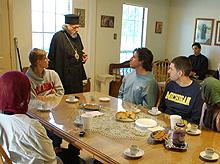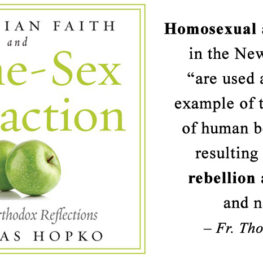 by Dn. Paul Zaharas –
by Dn. Paul Zaharas –
Over the past several decades the external pressures and challenges associated with parenting teenagers have been varied.
Whether it was the introduction of rock and roll music, the “social scourge” of the 1950’s, or the pervasiveness of today’s social networking explosion, parents have faced the challenge of helping their children bridge the chasm that stands between childhood and adulthood. As Christian parents we recognize the importance of raising Godly-minded children and we must take appropriate steps to help them in their journey toward Him. Society today, through media, peer influence, and accepted norms, can convey ideas that do not coincide with the teachings of Orthodox Christianity. In fact, oftentimes, the messages that our teen children receive from the world are in direct contradiction to the saving message of Jesus Christ.
Experiencing sleepless nights worrying about their children falling into substance use/abuse, sexual promiscuity and perversion, “over-connectedness” to social media, materialism, and a myriad of other harmful behaviors, parents at times feel overwhelmed by the challenge of addressing all of these issues with their teens. In the Book of Proverbs we read: “Train up a child in the way he should go, and when he is old he will not depart from it.” (22:6) This sounds simple enough, but given the variety of challenges that life throws at our young people, how can a parent successfully prepare their teen for every situation? The simple answer to this question is that you can’t address each and every possible circumstance that your child will face. We know from our own experience, as well, that there isn’t always someone standing by, watching our every move and steering us clear of mistakes and miscues. What we can offer to our children, however, are the tools which are necessary for them to address challenges on their own.
We are taught by the Church that each individual is created in the image of God, but what does this really mean? Without venturing into deep theological discussion, we can understand being created in the image of God to mean that we posses two of His specific attributes; intellect and free will. First of all, we have intellect, the ability to think.
Scientists will tell us that humans have the same type of “fight or flight” instincts that lower animals do, however, we also have the capacity for higher thought in the form of problem solving and comprehension. Likewise, God has granted to us free will, the ability to make conscious choices, rather than be subject to mere reflex reactions.
With this in mind, the challenge given by the directive found in Proverbs to “train up a child in the way he should go” is much more attainable. If we are able to teach teens to utilize their God-given intellect and free will to make decisions that are physically and spiritually healthy, we are training them up in the way they should go.
This being said, teenagers are notorious for making poor decisions. Certainly this can be attributed to many causes, two of which are that decision-making centers of the brain are not fully developed at this stage in life, and the fact that teenagers are still trying desperately to establish their own unique identities. For this reason, Christian decision-making is a skill set that needs some instruction and practice. Here are some steps that you can take with your teenager:
1. It is vital to impress on our teens the importance of making quality decisions. They need to be well aware that decisions have consequences, and that consequences have ripples. What is meant by this is that the choices they make generate real results, positive or negative, and those results affect not only the individual, but those people and things around them. An example that is easy to understand would be underage drinking. The decision to illegally drink alcohol can lead to health problems, trouble with the law, and physical harm to oneself or others. Likewise, those consequences spread and affect a teen’s parents, family, and peers. In a greater sense, sinful behavior separates us from God and this separation has a negative effect on our relationships with others and our overall well-being.
2. Together with your teenager, identify some decisions or conflicts that are applicable to their own lives or to your family.
These issues can range from relatively minor items with younger teens, such as what to wear to school, to more lifechanging matters like moral questions or vocation/occupation choice. Through this exercise your child may recognize choices they did not otherwise realize that they had.
3. Help your child to carefully consider the options that are presented with each decision. Many times young people fail to look at the possible outcomes of their choices prior to making them. By making a conscious effort to weigh the potential positive and/or negative results of their actions, teens become better equipped in their decision-making process.
4. Clearly the most important point to remember in developing Christian decision-making skills is to make Christ the primary factor in every choice. A number of years ago “What Would Jesus Do?” (WWJD) bracelets were very popular and encouraged wearers to apply that question to their everyday actions. For us as Orthodox Christians, however, a much more basic and important question should be asked; does this particular action lead me closer to, or further away from God?
5. Now that your teen has considered the options and possible consequences of their actions, let them make their own decision. With your help they have used their intellect and educated themselves on important aspects of a choice, and now they are ready to exercise their free will to decide.
6. After the decision has been made and consequences are realized, speak to your teen about the decision they have made. By offering them constructive feedback you will enable them to better understand what has occurred and how them may repeat positive, or avoid negative outcomes in the future. Ultimately, as members of the Body of Christ, we are called to seek after our Lord and His Eternal Kingdom. In sharing the Christian faith with our teenage children we, along with the Church, present to them the choice of this path. Enabling them to be good, Christian decision-makers gives them the opportunity and ability to successfully take steps in this journey.
HT: Pravmir.com



